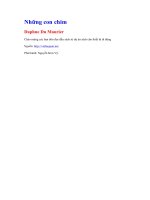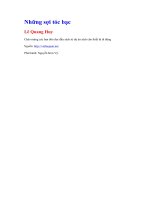FINAL INS 3032 nguyễn đức quang 17071153
Bạn đang xem bản rút gọn của tài liệu. Xem và tải ngay bản đầy đủ của tài liệu tại đây (112.45 KB, 6 trang )
INS3032 FINAL
ASSIGNMENT
FINAL ASSIGNMENT
Grade
(Office Use Only)
SUBJECT CODE: INS3032
Date received
(Office Use Only)
Date received
(Office Use Only)
Name : Nguyen Duc Quang
Class : IB2017B
PART 1: EXERCISES
EX1
Case 1 *
STEP 1 : Borrow 1 mil EUR to invest in CAD
Invest payable : 1,000,000*4% = 40,000
STEP 2 : Convert to CAD= 1,000,000/0,7344 = 1361,655,773 CAD
STEP 3 : Invest in CAD = 1361,655,773 *( 1+ 2,5%) = 1,395,697.167 CAD
STEP 4 :Convert back to EUR = 1,395,697.167*0,7330 = 1,023,046.024 EUR
STEP 5 : Compare : 1,023,046.024 - 1,000,000-40000 = -16,953.98
It is loss
Case 2 *
STEP 1 : Borrow 1 mil CAD to invest in EUR
Invest payable : 1,000,000*3% = 30,000
STEP 2 : Convert to EUR= 1,000,000*0,7322 = 732,200
STEP 3 : Invest in EUR = 732,200*(1+3,5%)= 757,827 EUR
STEP 4 :Convert back to CAD = 757,827/0.7358= 1,029,936.124 CAD
STEP 5 : Compare : 1,029,936.124- 1,000,000-30000 = -63,88
So it still loss.
EX4. Suppose that the US government imposes higher tax applied on rice imported
from Vietnam. How do these events affect exchange rates between USD and VND on
the foreign exchange market (FX)? The central bank of Vietnam (SBV) would like to
maintain the previous rate. What actions will they do?
1. Impact on currency on foreign exchange market when higher rice import tax is
applied:
The price of rice in general in the US market will increase, reducing Vietnam's
demand for rice (when Vietnam is one of the world's No. 1 rice exporters and has a
very cheap price). This will reduce demand for the American people in general and for
VND in the market, leading to an increase in USD/VND exchange rate volatility. The
association will then make imports from Vietnam less attractive, reducing the flow of
USD into the country and causing the VND exchange rate to decrease against the
USD in the foreign exchange market.
2. The Central Bank of Vietnam may take the following measures to maintain the
previous exchange rate:
● Regulate member banks through capital or reserve requirements and provide
loans and services to the country's banks and governments.
● Buy and sell securities on the open market, including other currencies.
● Other techniques for manipulating currency values and exchange rates may be
used, such as direct capital or currency controls.
● Support to reduce import tax on convertible items to serve the goal of
increasing agricultural production
EX3
PART A.
Quality Spread Differential is the difference between market rates of interest rates
applicable to two parties on the basis of their Credit Rating. If QSD is positive then
there exists a profitable opportunity of entering into interest rate swaps between 2
parties. QSD is calculated as :
QSD = Fixed Interest Rate Differential - Floating Interest Rate Differential
Fixed Interest Rate Differential = 7% - 5% = 2%
Floating Interest Rate Differential = LIBOR - (LIBOR+1%) = -1%
QSD = 2% - (-1%) = 3%
Hence Alpha can swap its Floating Interest Rate for the Fixed Interest Rate. In simple
words Alpha will pay interest @ LIBOR to Beta whereas Beta will pay interest @5%
to Alpha.
PART B
All-in-Cost is the total cost incurred by both the parties including processing charges
if any. The costs associated with an investment can adversely impact an investor's
ability to profit, so understanding the all-in costs of a trade, including the spread and
commission, is important. In terms of loans, consumers need to understand the true
cost of their loans, including closing costs and interest, in order to evaluate both their
ability to repay and whether the item is worth that expense. We take a closer look at
all-in costs below.
In the given case the All-in-Cost will consist of only the interest rates as there are no
other charges. Hence All-in-Cost :
Fixed Interest Rate @5% + Floating Interest Rate @LIBOR = LIBOR + 5%
Cost Savings in borrowings = 3% which is split as 60% to Alpha i.e 1.8% and 40% to
Beta i.e 1.2%.
All-in-Cost for Alpha = LIBOR + 1.2% as the Floating Rate of Alpha is higher All in
Cost for Beta = 5% + 1.8% = 6.8%
PART C
Including Charge by Bank = 1%
Cost Savings = 3%
Net Savings = 2% distributed equally between Alpha and Beta
hence AIC for Alpha = LIBOR + 1% + 0.5% = LIBOR + 1.5%
AIC for Beta = 5% + 1% + 0.5% = 6.5%
ESSAY QUESTION :
Question 1 :
The war between Russia and Ukraine has been a very hot topic affecting all
continents recently. While the border war situation between the two sides is extremely
tense, from an economic point of view, it is also a crisis with positive effects along
with recognizable negatives. After the shock of the Covid-19 pandemic, the world
economy had not yet recovered, the outbreak of the Russia-Ukraine military conflict
threatened a terrible economic crisis.
According to the assessment of the International Monetary Fund (IMF), the
events that took place from February 24, 2022 when Russia conducted a special
military operation against Ukraine, have become one of the main factors hindering
recovery of the global economy after the crisis caused by the Covid-19 pandemic. The
IMF has lowered the economic growth forecast in 2022 of nearly 150 countries, with
the global gross domestic product (GDP) at 86%. Specifically, in 2023, the growth
rate is forecast to decrease by 0.2%; oil, food and fertilizer prices will increase
sharply; The restructuring of international shipping and logistics chains as well as
emerging disruptions in the global payment system could cost the global economy in
2022 about $1 trillion, equivalent to 1% of GDP Global.
Also a clean counter to sanctions against Russia, on February 26, 2022, Western
countries took Russia out of the global payment system (SWIFT) in the third package
of sanctions. In the statement, the Chairman of the Commission said the new
sanctions, agreed by the US, France, Canada, Italy, the UK and the European
Commission, include limiting the Bank of Russia's ability to support the ruble, the
European Commission (EC) said. . In addition, individuals and institutions in Russia
and countries that support Moscow in the conflict with Ukraine are also targeted by
the sanctions.
In the face of the fact that the assets of countries are stored in USD when there is
political turmoil, it is used by the US and the West as one of the effective sanctions,
causing many countries to change and the USD to stand still. before the risk of losing
credibility in the world basket of money. Although all the major players in the world's
currency markets are not interested in a quick abandonment of the dollar, most
financial experts agree that the crisis involving Ukraine and especially US sanctions
on important Russian banks will reduce the role of the dollar in the global financial
system. It is likely that by the end of this decade, the US dollar's share in global
foreign exchange reserves, which is currently around $12 trillion, will be cut by more
than half.
In view of the current state of the world economic picture, pessimists believe that the
recent economic disruption is irreversible and that the crisis will only accelerate the
trend of de-globalization and fragmentation. subdividing the world economy.
Optimists, however, argue that, although the crisis is significantly disrupting global
energy, food and food markets, as well as international finance, the trading systems,
investment and Global investment and finance are now self-correcting and will
recover. Self-regulation could thus prevent the world from slipping into another
recession that could lead to chronic food shortages or the loss of the dollar as a major
international reserve currency.
To overcome the economic crisis, the most comprehensive solution is that Russia and
Ukraine must negotiate, end the conflict and the West remove all or at least part of the
embargo and sanctions. Russia, especially in terms of energy and food. Because
Russia is the largest energy supplier to Europe and plays a major role as a supplier of
wheat, contributing to ensuring food security for the world.
Question 2 :
Vietnam is still a country that relies heavily on agricultural development, so
petroleum is an important strategic commodity and accounts for 3.52% of the total
production cost of the entire economy, accounting for 1.5 percent of the total cost of
production. % of total household consumption. Petroleum is used in almost all
industries and fields; Therefore, fluctuations in gasoline prices will strongly affect
producer prices and consumer prices. According to the General Statistics Office, a
10% increase in domestic fuel prices will increase inflation by 0.36%. Therefore, the
more fuel prices increase, the more likely that inflation will lead to a market crisis.
SSI Securities Company noticed that the movements of the global financial market
continued to be affected by political tensions between Russia - Ukraine as well as the
message of interest rate increase from the Fed. Pressure on VND has appeared in
recent times. The main reason is that the USD tends to strengthen in the international
market as well as the foreign currency supply has not recovered because the trade
deficit in the first two months of the year is estimated at 0.9 billion USD and the peak
period of overseas remittances. The truth is that when the USD appreciates, it will
make Vietnamese exports more expensive, reducing competitiveness for markets other
than the US.The pressure of interest rates and inflation increased, along with the
recovery of the stock market and the strong dollar, making investors fear that gold
would drop, so they sold to take profits, causing the gold price to also go down.
In order for the dong to not fall into an uncontrolled inflation situation, the State Bank
of Vietnam should meet with the government first to control gasoline prices from
rising too quickly. The government can reduce excise tax and environmental tax on
the petroleum industry. at the same time, the State Bank can focus on using the central
bank's interest rate system as a tool to adjust the exchange rate in addition to buying
and selling through the foreign currency reserves of the State Bank. To do that, the
interest rate of the Central Bank must fully reflect the increase and decrease of the
domestic money supply. In turn, the increase or decrease in the money supply depends
on the forecast of inflation. The State Bank only buys and sells foreign currencies in
case supply and demand are not balanced at the central equilibrium exchange rate.


